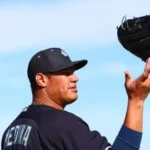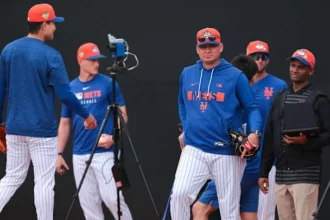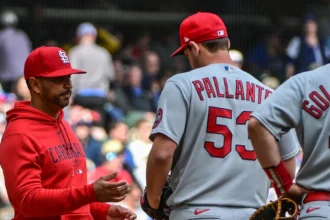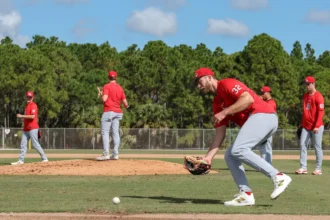As the Los Angeles Dodgers fight to stay alive in the 2025 World Series, trailing the Toronto Blue Jays three games to two, a powerful and familiar voice from Mookie Betts’s past has stepped forward with a heartfelt message. Hall of Famer and Boston Red Sox icon David Ortiz, a mentor and former teammate of Betts, has publicly urged the Dodgers’ star to rediscover the fire and confidence that once made him one of the game’s most electrifying players. Ortiz’s emotional appeal came just before Game 5 at Dodger Stadium, as Los Angeles—desperate for offensive life—looked to its veteran leaders to ignite a spark.
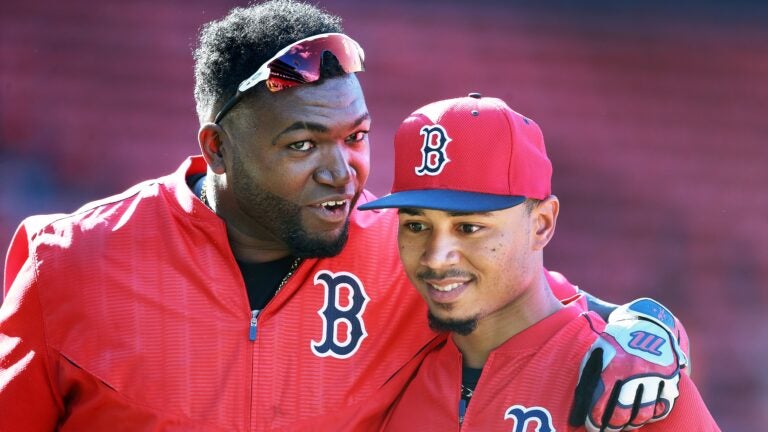
For Betts, the timing of Ortiz’s message couldn’t be more crucial. The Dodgers’ lineup has gone cold on baseball’s biggest stage, and Betts, their usual catalyst at the top of the order, has been conspicuously quiet. Known for his consistency, discipline, and knack for clutch moments, the eight-time All-Star and 2018 American League MVP has struggled to find his rhythm this October. Through the first five games of the World Series, he has managed just a .130 batting average (3-for-23), all singles, with no extra-base hits and a lone run scored. Over the entire 2025 postseason, he’s hitting .234 with a .648 OPS and no home runs across 15 games—a sharp contrast from last year’s dominant playoff performance when he powered Los Angeles to a championship while boasting a .951 OPS.
For a player of Betts’s caliber, these numbers are startling. His swing, once fluid and explosive, now appears tight and tentative, almost as if he’s pressing to make something happen rather than letting his natural instincts take over. His timing is slightly off, and even his usually sharp eye at the plate has shown cracks as opposing pitchers exploit his uncharacteristic hesitation. The Dodgers, who rely heavily on Betts to set the tone, have suffered as a result. Without his usual spark, the offense has stalled, leaving stars like Freddie Freeman and Will Smith to shoulder the load against a relentless Blue Jays pitching staff.
During FOX Sports’ pregame coverage before Game 5, Ortiz, never one to mince words, spoke directly to Betts—and to the millions watching at home—with an impassioned challenge. “You’re one of the greatest players to have ever played this game,” Ortiz said, his tone equal parts encouragement and demand. “But you gotta go to home plate with that beastmode that you have in you, kid.” The message was simple yet profound: stop overthinking, stop pressing, and start playing like the Mookie Betts who once took the baseball world by storm.
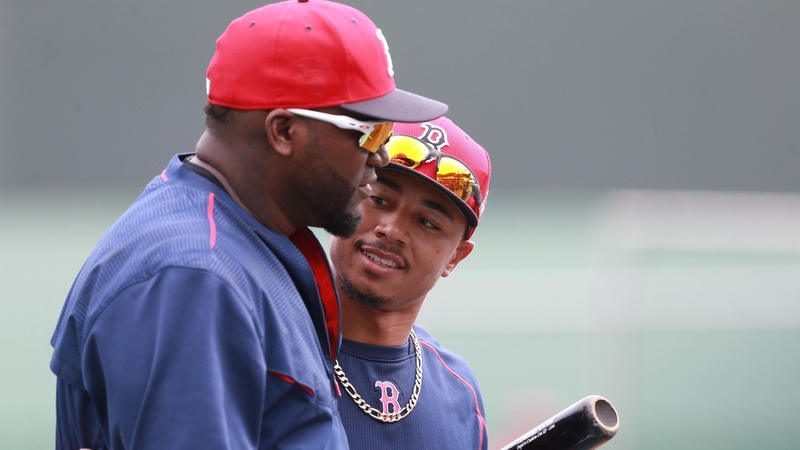
“You’re one of the greatest players to have ever played this game… But you gotta go to home plate with that beastmode that you have in you, kid.”
Coming from Ortiz, those words carry immense gravity. “Big Papi” built his Hall of Fame legacy on delivering in the postseason, launching 17 home runs and driving in 61 runs across 85 career playoff games. His résumé includes three World Series titles with the Red Sox, capped by unforgettable performances that defined his reputation as one of baseball’s most clutch hitters. Ortiz’s voice resonates not only because of his accomplishments but because he understands the unique pressure of October baseball—the mental grind that can consume even the most gifted players.
Ortiz and Betts share a special bond rooted in their time together in Boston. When Betts debuted for the Red Sox in 2014, Ortiz was the team’s elder statesman, its emotional leader, and a mentor to the young phenom who would soon inherit the spotlight. Ortiz saw in Betts a rare blend of athleticism, intelligence, and confidence—a player capable of leading a franchise. Betts, in turn, learned from Ortiz what it meant to perform when the stakes were highest. Together, they helped shape a winning culture in Boston that culminated in Betts capturing the 2018 MVP award and leading the Red Sox to a World Series title before his eventual trade to Los Angeles.
Now, years later, Ortiz’s message serves as both a reminder and a rallying cry. He isn’t simply cheering on a former teammate—he’s reminding Betts of the player he once molded, the competitor who thrived under pressure rather than shrank from it. Ortiz’s challenge is about mindset: playing with joy, confidence, and aggression, rather than fear of failure. It’s about rediscovering the inner fire that once made Betts unstoppable.
For the Dodgers, the stakes couldn’t be higher. Down 3-2 in the series, every at-bat carries monumental weight. The Blue Jays, led by Vladimir Guerrero Jr. and a deep pitching staff, have shown no signs of easing up. Toronto’s pitchers have consistently attacked Betts early in counts, mixing offspeed pitches and inside fastballs to keep him uncomfortable. His struggles have rippled through the lineup, forcing manager Dave Roberts to juggle batting orders and search for offensive balance.
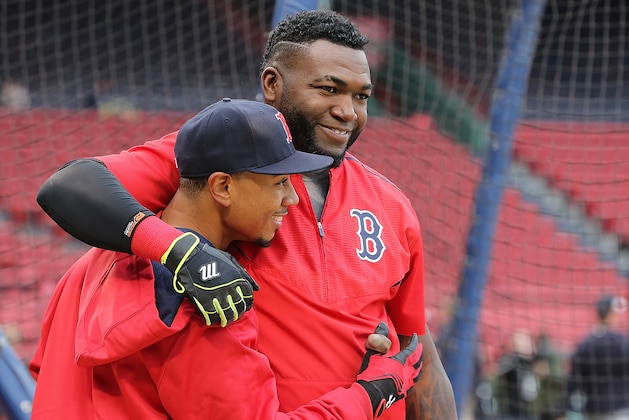
But the Dodgers know one thing: when Mookie Betts gets going, everything changes. His ability to impact a game in multiple ways—through hitting, baserunning, and defense—makes him a true five-tool player. When he’s confident, he becomes contagious, elevating those around him. Ortiz’s plea wasn’t just motivational—it was a strategic reminder of how much Betts means to his team’s identity. The Dodgers feed off his energy. If he can find his rhythm, Los Angeles might still have life left in this World Series.
Ortiz’s “beastmode” comment quickly went viral on social media, resonating with fans and players alike. Many recalled similar moments when Ortiz himself flipped the switch—such as his game-tying grand slam in the 2013 ALCS against Detroit or his near-single-handed domination of St. Louis in the World Series that same year. “Big Papi” has always been synonymous with postseason magic, and in many ways, he’s passing the torch again—urging Betts to embrace that same fearless approach.
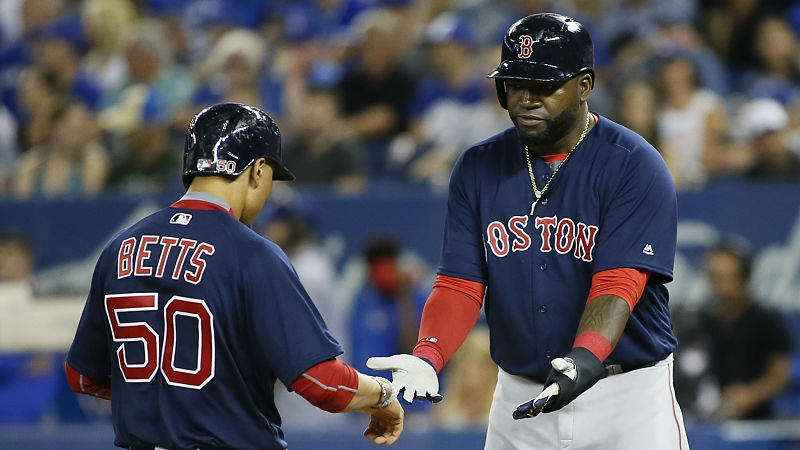
For Betts, it’s not just about technique—it’s about mentality. Over the years, he’s spoken often about the importance of preparation, focus, and consistency. But the postseason often demands something less tangible: emotion. Ortiz’s call for “beastmode” wasn’t about mechanics or swing paths—it was about heart. It was about playing with conviction, exuding swagger, and letting passion fuel performance. Ortiz knows that for Betts, greatness comes when he plays loose, confident, and aggressive.
As Game 5 approached, the Dodgers hoped Ortiz’s message would resonate. Clubhouse insiders described a quiet but determined mood. Betts, ever the professional, wasn’t one to make bold promises, but his demeanor suggested focus. “We’ve got to take it one game at a time,” he told reporters earlier in the day. “I just need to do my part.” For Betts, “doing his part” has always meant more than personal statistics—it’s about leadership. His teammates look to him not only for production but for stability, especially in moments of adversity.

And if anyone can inspire a turnaround, it’s Ortiz. His credibility extends beyond Boston and across generations of players. Even those who never played with him respect his voice. When Ortiz speaks, players listen. His ability to blend tough love with empathy makes his words land differently. He’s not criticizing Betts; he’s challenging him to remember who he is—a perennial MVP candidate, a two-time World Series champion, and one of baseball’s most dynamic forces.
For Dodgers fans, Ortiz’s message offers a glimmer of hope. A rejuvenated Betts could be the difference between heartbreak and history. Los Angeles has come back from elimination before, and their roster remains loaded with talent capable of flipping the script. If Betts can lead the charge—perhaps with one defining swing or one electrifying moment on the bases—the narrative of this World Series could shift in an instant.
The parallels between Ortiz and Betts are impossible to ignore. Both players rose from humble beginnings to become generational stars. Both have built reputations as consummate professionals with unshakable work ethics. And both have carried the weight of expectations for storied franchises. Ortiz’s career proved that legacy is written in October; now he’s challenging Betts to do the same—to seize the moment and etch his name deeper into postseason lore.
Baseball, after all, has always been about moments—those flashes of brilliance that define careers and captivate fans forever. Ortiz knows this better than anyone. His message to Betts is not merely advice—it’s a reminder that legends are born in times of struggle. The Dodgers may be on the brink, but one swing from Betts could change everything. It could revive a team, restore belief, and silence doubt.
As the lights brighten over Chavez Ravine and Game 5 unfolds, all eyes are on Mookie Betts. Can he answer the call from his old mentor? Can he rediscover the “beastmode” that once made him unstoppable? Ortiz believes he can—and so does Los Angeles. For Betts, this isn’t just another game. It’s an opportunity to remind the world why David Ortiz once saw greatness in him—and to prove that the fire still burns bright.
No matter how the series ends, one thing is certain: Ortiz’s words will linger. They speak to something larger than baseball—a shared belief between two competitors that greatness never disappears; it just needs a spark. And for Mookie Betts and the Dodgers, that spark might have just arrived in the form of a legend’s voice echoing from the past, urging a star to rise again when it matters most.
MORE MLB NEWS


